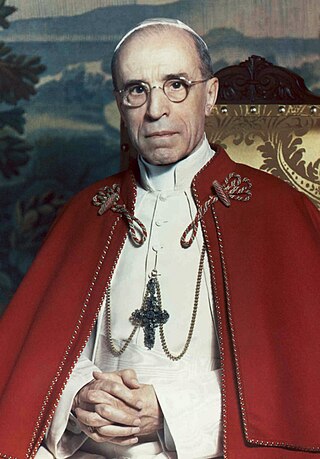
Pope Pius XII was head of the Catholic Church and sovereign of the Vatican City State from 2 March 1939 until his death in October 1958. Before his election to the papacy, he served as secretary of the Department of Extraordinary Ecclesiastical Affairs, papal nuncio to Germany, and Cardinal Secretary of State, in which capacity he worked to conclude treaties with various European and Latin American nations, including the Reichskonkordat treaty with the German Reich.
An encyclical was originally a circular letter sent to all the churches of a particular area in the ancient Roman Church. At that time, the word could be used for a letter sent out by any bishop. The word comes from the Late Latin encyclios. The term has been used by Catholics, Anglicans and the Eastern Orthodox Church. Catholic social teaching has advanced 19 encyclicals.

The magisterium of the Catholic Church is the church's authority or office to give authentic interpretation of the word of God, "whether in its written form or in the form of Tradition". According to the 1992 Catechism of the Catholic Church, the task of interpretation is vested uniquely in the Pope and the bishops, though the concept has a complex history of development. Scripture and Tradition "make up a single sacred deposit of the Word of God, which is entrusted to the Church", and the magisterium is not independent of this, since "all that it proposes for belief as being divinely revealed is derived from this single deposit of faith".

Final Fantasy XII is a role-playing video game developed and published by Square Enix. The twelfth main installment of the Final Fantasy series, it was first released for the PlayStation 2 in 2006. It introduced several innovations to the series: an open world; a seamless battle system; a controllable camera; a customizable "gambit" system, which lets the player control the artificial intelligence (AI) of characters in battle; a "license" system, which determines what abilities and equipment can be used by characters; and hunting side quests, which allows the player to find and defeat increasingly difficult monsters in the game's open world. Final Fantasy XII also includes elements from previous games in the series, such as Chocobos and Moogles.
A gambit is a type of chess opening move in which one of the pieces is sacrificed in order to achieve a better position.

Holly Black is an American writer and editor best known for her children's and young adult fiction. Her most recent work is the New York Times bestselling young adult Folk of the Air series. She is also well known for The Spiderwick Chronicles, a series of children's fantasy books she created with writer and illustrator Tony DiTerlizzi, and her debut trilogy of young adult novels officially called the Modern Faerie Tales. Black has won an Eisner Award, a Lodestar Award, a Nebula Award, and a Newbery Honor.
Humani generis is a papal encyclical that Pope Pius XII promulgated on 12 August 1950 "concerning some false opinions threatening to undermine the foundations of Catholic Doctrine". It primarily discussed, the encyclical says, "new opinions" which may "originate from a reprehensible desire of novelty" and their consequences on the Church.
Gymnobiblism is the opinion that the bare text of the Bible, without commentary, may be safely given to the unlearned as a sufficient guide to religious truth.
Pietro Parente was a long-serving theologian in the Holy Office of the Roman Catholic Church, and was made a cardinal on 26 June 1967. At his peak he was regarded as one of the foremost Italian theologians.
Mediator Dei is a papal encyclical issued by Pope Pius XII on 20 November 1947. It was the first encyclical devoted entirely to liturgy.

The Magisterium of Pope Pius XII consists of some 1,600 mostly non-political speeches, messages, radio and television speeches, homilies, apostolic letters, and encyclicals of Pope Pius XII. His magisterium has been largely neglected or even overlooked by his biographers, who center on the policies of his pontificate.

Raimondo Spiazzi OP was an Italian Catholic theologian, advisor to Pius XII, and Mariologist with over 2,500 publications.

The theology of Pope Pius XII is reflected in his forty-one encyclicals, as well as speeches and nearly 1000 messages, during his almost 20-year pontificate. The encyclicals Mystici corporis and Mediator Dei advanced the understanding of membership and participation in the Catholic Church. The encyclical Divino afflante Spiritu began opening the door to historical-critical biblical studies. But his magisterium was far larger and is difficult to summarize. In numerous speeches Catholic teaching is related to various aspects of life, education, medicine, politics, war and peace, the life of saints, Mary, the mother of God, things eternal and temporal.

Social teachings of Pope Pius XII refers to encyclicals, apostolic constitutions and speeches by Pope Pius XII on non-theological issues involving medicine, science, education, social justice, family and sexuality, and occupations.

The Mariology of the popes is the theological study of the influence that the popes have had on the development, formulation and transformation of the Roman Catholic Church's doctrines and devotions relating to the Blessed Virgin Mary.

A dogma of the Catholic Church is defined as "a truth revealed by God, which the magisterium of the Church declared as binding". The Catechism of the Catholic Church states:
The Church's Magisterium asserts that it exercises the authority it holds from Christ to the fullest extent when it defines dogmas, that is, when it proposes, in a form obliging Catholics to an irrevocable adherence of faith, truths contained in divine Revelation or also when it proposes, in a definitive way, truths having a necessary connection with these.
Non-overlapping magisteria (NOMA) is the view, advocated by paleontologist Stephen Jay Gould, that science and religion each represent different areas of inquiry, fact vs. values, so there is a difference between the "nets" over which they have "a legitimate magisterium, or domain of teaching authority", and the two domains do not overlap. He suggests, with examples, that "NOMA enjoys strong and fully explicit support, even from the primary cultural stereotypes of hard-line traditionalism" and that it is "a sound position of general consensus, established by long struggle among people of goodwill in both magisteria." Some have criticized the idea or suggested limitations to it, and there continues to be disagreement over where the boundaries between the two magisteria should be.

His Dark Materials is a fantasy drama television series based on the trilogy of novels by Philip Pullman. It is produced by Bad Wolf and New Line Productions, for BBC One and HBO, with the latter handling international distribution. The show follows the orphan Lyra as she searches for a missing friend and discovers a kidnapping plot related to an invisible cosmic substance called Dust.









